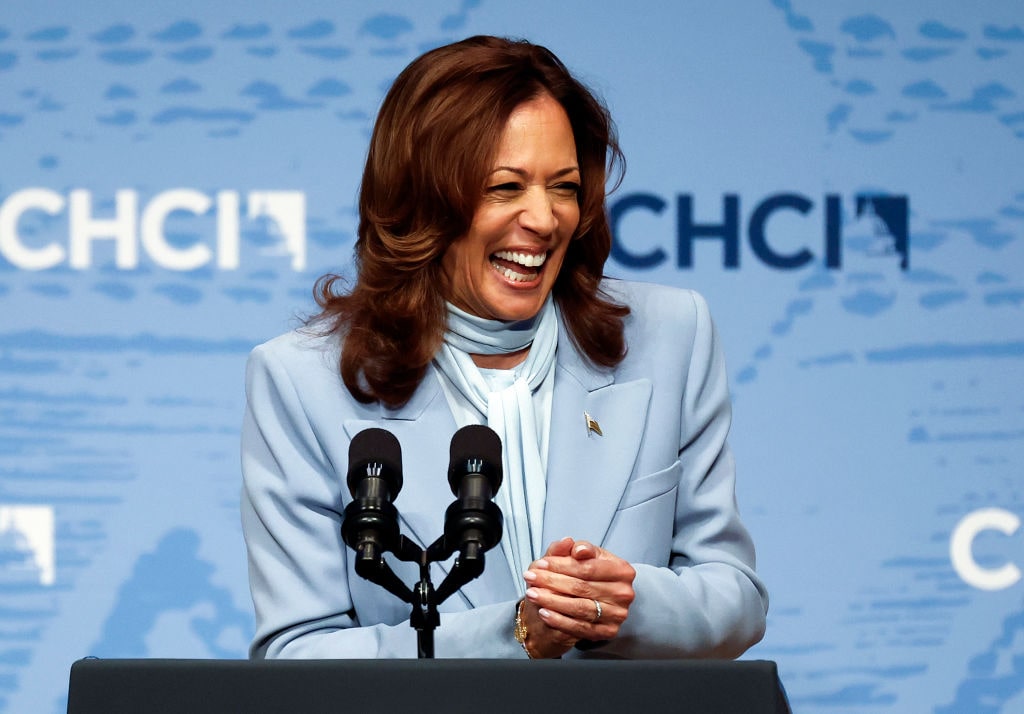



Vice President Kamala Harris has proposed approximately $5 trillion in tax hikes over the next ten years, targeting wealthy Americans and rich corporations. For a federal government forecast to register $2 trillion in budget deficits during the same span, could this be the revenue boost needed to fix America’s deteriorating fiscal health? The projections show her policies are not even close to plugging the federal budget’s gaping hole.
The public has heard the same song-and-dance routine for the last 20 years: Washington must make the affluent pay their fair share by imposing sizable tax hikes. Interestingly enough, the income tax shares before and after the Trump-era tax cuts are quite a sight for progressives. In 2021, the top 1% paid 45.8% of the nation’s income taxes, up from 37.3% in 2016. Conversely, the bottom 50% paid just 2.3% of the country’s income taxes after Trump’s landmark legislation, down from 3% before Trump.
Like former President Donald Trump’s policy proposals, many of the vice president’s ideas must pass Congress. A Republican-led lower and upper chamber decreases the odds that Harris’ initiatives will be approved and make it to her desk to be signed. But let’s say Kamalanomics looks like Monica Bellucci, and lawmakers on both sides fall in love with the economic doctrine. How much revenue would these tax hikes generate?
Estimates vary by group. The Committee for a Responsible Federal Budget, for example, says the revenue effect from the Harris plan would bring in about $900 billion from fiscal years 2026 to 2035. The rosiest projections come from the Tax Foundation. The organization projects that Harris’ revenue generators would raise as much as $4.143 trillion over ten years, with much of the burden on corporations.
Here is a breakdown of the central Harris tax hikes, courtesy of the research think tank:
When her other policy blueprints are inserted into the equation, such as instituting housing tax credits, reinstating the American Rescue Plan’s child tax credit, and exempting tips from federal income tax, net revenues would be about $1.7 trillion.
Of course, like many other fiscal prognostications, the Trump and Harris outlooks are based on expectations that the United States will not slip into a recession, enter a major military conflict, or suffer another health pandemic. If so, goodbye revenues and hello new spending.
Let’s say Harris does fill government coffers with more than $4 trillion, the middle-class tax cuts lead to hefty gains (hi, Laffer Curve!), and the economic landscape and financial markets stay the same. Everything is going well for the world’s largest economy. Based on projections by the nonpartisan Congressional Budget Watchdog (CBO), these numbers would cover only some of the federal government’s interest payments.
In June, the budget watchdog updated its ten-year budget and economic outlook. The cumulative net interest charges will total roughly $13 trillion, according to the CBO. So, all the collections from the Harris tax hikes would help service the national debt – predicted to top $50 trillion by 2034 – rather than balance the books. Consider this: In the first 11 months of the current fiscal year, nearly half of all individual income tax collections have been dedicated to interest charges.
Even if interest payments were not included in the budget, tax hikes from a potential Harris-Walz administration would still fail to address the enormous imbalance. Over the next decade, cumulative outlays and revenues are projected to be $72 trillion (not including interest costs) and $63 trillion, respectively. This leaves a $9 trillion hole.
The deteriorating fiscal health is so severe that even $5 trillion in tax hikes would be insufficient to pay America’s bills. It would be absurd to think that federal spending would be reined in with an injection of exorbitant receipts, meaning Uncle Sam’s financial situation would only worsen. Eminent economist Milton Friedman had it right when he wrote, “Government will spend whatever the tax system raises, plus as much more as they can get away with.” Indeed, a $5 trillion tax increase means $5 trillion more to spend for Democrats on the welfare state and Republicans on the military-industrial complex.
